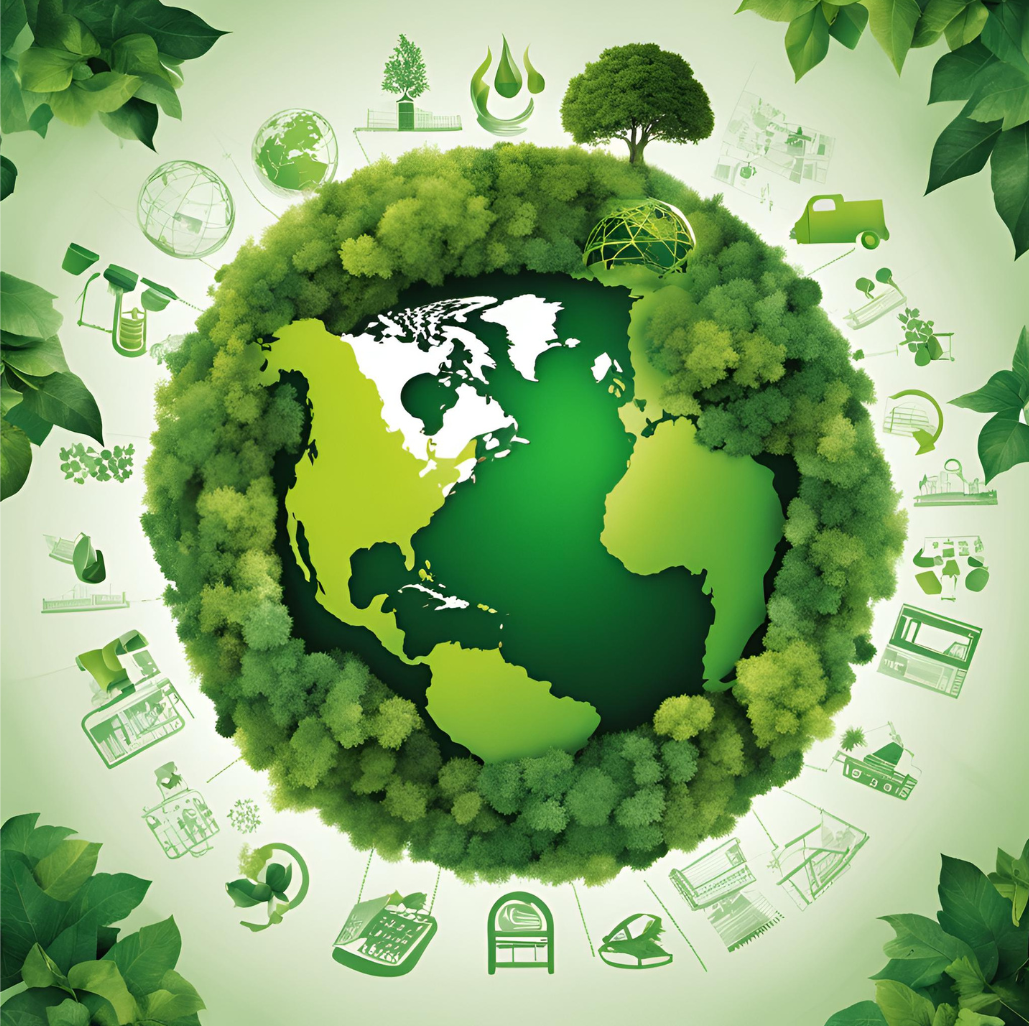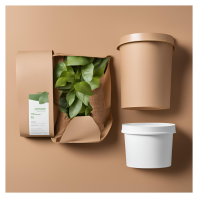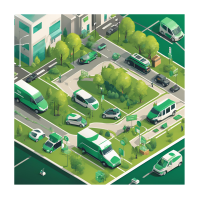By Emma Lester-Devitt, Managing Partner & Co-Founder

In today's rapidly evolving retail landscape, sustainability has become a critical focus for businesses worldwide. As consumers increasingly demand eco-friendly products and transparent operations, retailers are turning to innovative, sustainable practices for retail supply chains to meet these expectations while also improving efficiency and reducing costs. This article explores the cutting-edge approaches to transforming retail supply chains and paving the way for a greener future in the industry. By implementing sustainable practices for retail supply chains, companies are addressing environmental concerns and creating more resilient and competitive business models.
Introduction
Sustainability in retail supply chains encompasses a wide range of practices designed to minimise environmental impact, promote social responsibility, and ensure long-term economic viability. Every supply chain step, from sourcing raw materials to delivering products to consumers, presents opportunities for innovation and improvement.
The importance of innovation in driving sustainability cannot be overstated. As traditional supply chain models struggle to meet the demands of an eco-conscious market, innovative approaches are essential for retailers to remain competitive and responsible corporate citizens.
Current State of Retail Supply Chain Sustainability
Key Challenges in Traditional Retail Supply Chains
Traditional retail supply chains face numerous sustainability challenges, including:
- High carbon emissions from transportation and logistics
- Excessive packaging waste
- Lack of transparency in sourcing and production
- Inefficient resource use and energy consumption
- Limited product lifecycle management
Growing Pressure for Sustainable Practices
The push for sustainability in retail supply chains is intensifying. According to a 2023 report by Deloitte,
55% of UK consumers have reduced their use of single-use plastics, and 45% have chosen brands that demonstrate environmentally sustainable practices.
This shift in consumer behaviour puts pressure on retailers to adopt more sustainable practices throughout their supply chains.
Innovative Technologies Driving Sustainability
Blockchain for Supply Chain Transparency
Blockchain technology is revolutionising supply chain transparency. By creating an immutable record of each transaction and movement within the supply chain, blockchain enables retailers to give consumers unprecedented visibility into product origins and journeys.
Case Study:
Marks & Spencer has implemented blockchain technology to trace the origin of its beef products. Customers can scan a QR code to view the complete journey from farm to fork.
Internet of Things (IoT) for Real-time Monitoring
IoT devices are transforming supply chain management by providing real-time data on product conditions, location, and inventory levels. This technology enables retailers to optimise routes, reduce waste, and ensure product quality throughout the supply chain.
Artificial Intelligence for Optimisation
AI algorithms are analysing vast amounts of supply chain data, identifying patterns and opportunities for optimisation. From demand forecasting to inventory management, AI is helping retailers reduce waste and improve efficiency across their operations.
Sustainable Packaging Solutions

Biodegradable and Compostable Materials
Innovative materials such as mushroom packaging and seaweed-based plastics offer sustainable alternatives to traditional packaging. These biodegradable solutions break down naturally, reducing the environmental impact of retail packaging.
Reusable Packaging Systems
Retailers are exploring reusable packaging systems to minimise waste. Companies like Loop partner with major brands to offer products in durable, reusable containers that are collected, cleaned, and refilled.
Minimalist Packaging Design
By rethinking packaging design, retailers reduce material use while maintaining product protection. This approach not only reduces waste but can also lower shipping costs due to decreased package size and weight.
Green Transportation and Logistics
Electric and Hybrid Vehicle Fleets
Many retailers are transitioning to electric and hybrid vehicles for their delivery fleets. This shift significantly reduces carbon emissions and can lead to long-term cost savings.
Route Optimisation for Reduced Emissions
Advanced algorithms are being used to optimise delivery routes, reducing fuel consumption and emissions. These systems consider factors such as traffic patterns, vehicle capacity, and delivery urgency to determine the most efficient routes.
Last-mile Delivery Innovations
Innovative last-mile delivery solutions, such as cargo bikes and autonomous delivery robots, are being piloted in urban areas to reduce congestion and emissions while improving delivery speed and efficiency.
Circular Economy Initiatives
Product Lifecycle Management
Retailers are adopting circular economy principles by designing products for longevity, repairability, and recyclability. This approach extends product lifecycles and reduces waste.
Reverse Logistics for Recycling and Upcycling
Innovative reverse logistics systems are enabling retailers to collect used products for recycling or upcycling. For example,
H&M's garment collection programme recycles old clothing into new products or industrial materials.
Rental and Resale Models
The rise of rental and resale models in retail is extending product lifecycles and reducing waste. Platforms, like Rent the Runway for fashion and BackMarket for electronics, are pioneering these circular economy approaches.
Sustainable Sourcing Practices
Ethical and Local Sourcing
Retailers increasingly focus on ethical and local sourcing to reduce transportation emissions, support local economies, and improve supply.
Regenerative Agriculture Partnerships
Some retailers are partnering with farmers who practice regenerative agriculture. This approach aims to improve soil health and biodiversity while sequestering carbon. Patagonia's Regenerative Organic Certified programme is a leading example of this approach.
Fair Trade and Worker Welfare Initiatives
Innovative partnerships and certification programmes are helping retailers ensure fair wages and safe working conditions throughout their supply chains. The Fairtrade certification is one widely recognised example of such initiatives.
Measuring and Reporting Sustainability
Advanced Analytics for Sustainability Metrics
Retailers are leveraging advanced analytics to measure and track their sustainability performance. These tools provide insights into areas such as carbon emissions, water usage, and waste production across the supply chain.
Transparent Reporting and Communication
Innovative reporting tools and platforms enable retailers to communicate their sustainability efforts more effectively to stakeholders. The Global Reporting Initiative (GRI) Standards provide a framework for comprehensive sustainability reporting.
Future Trends and Predictions
Emerging Technologies on the Horizon
Emerging technologies such as 3D printing for on-demand production and quantum computing for complex supply chain optimisation are poised to revolutionise sustainable retail practices further.
Evolving Consumer Expectations
As consumer awareness of sustainability issues grows, retailers' expectations will continue to evolve. Retailers proactively adopting innovative sustainable practices will be best positioned to meet these changing demands.
Conclusion
Innovative sustainable practices are transforming retail supply chains, offering solutions to long-standing environmental and social challenges while driving efficiency and cost savings. These innovations, from blockchain and IoT to circular economy initiatives and regenerative agriculture partnerships, reshape the retail industry.
As we look to the future, sustainability will continue to be a crucial factor in retail success. Retailers who embrace innovation and make sustainability a core part of their supply chain strategy will meet evolving consumer expectations and contribute to a more sustainable and resilient global economy.
For consumers, supporting retailers who implement these innovative practices is key to driving further positive change in the industry. By making informed choices and demanding transparency, we can all contribute to creating more sustainable retail supply chains.
The journey towards fully sustainable retail supply chains is ongoing, but with continued innovation and commitment from both retailers and consumers, a greener, more responsible retail industry is within reach.
Follow us on LinkedIn for our latest news.

